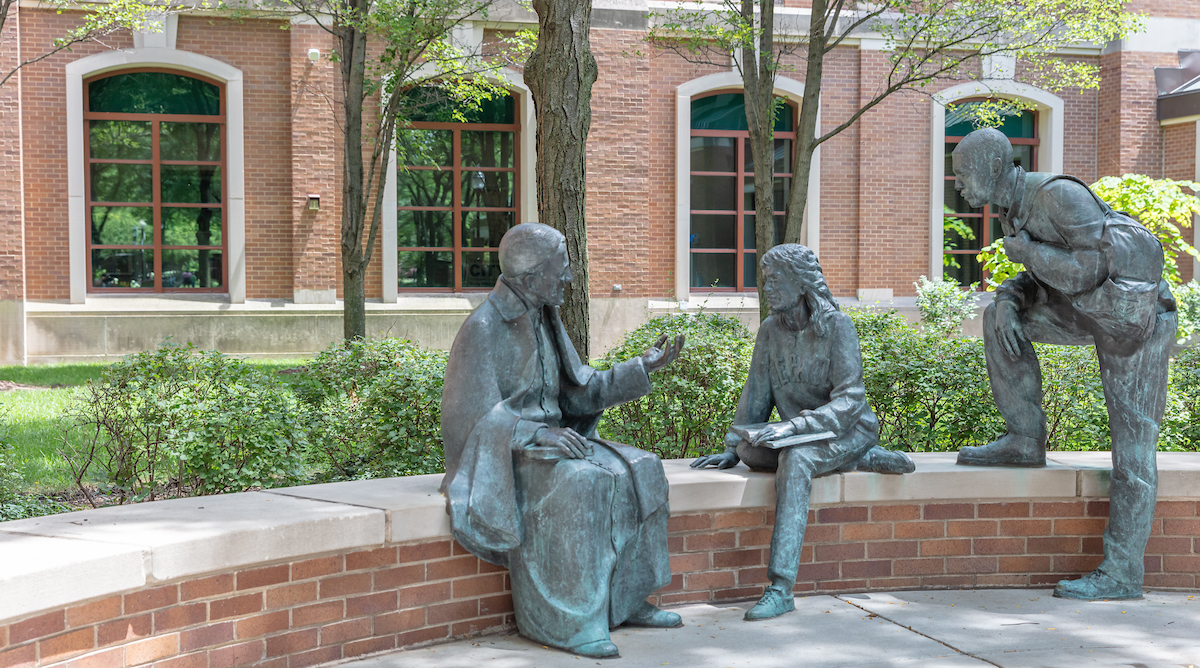 (DePaul University/Randall Spriggs)
(DePaul University/Randall Spriggs)
Faculty acknowledge the unique opportunity they have to recognize their students' need for mental health consultation, according to a recent study. As finals approach, University Counseling Services reminds all faculty and staff of available services and resources.
Researchers at
Boston University surveyed more than 1,600 college and university faculty across the country this year and found that nearly 90 percent believe student mental health has worsened during the COVID-19 pandemic. About 80 percent of the faculty reported having conversations with students about their mental health.
"Faculty are not mental health professionals, but they play an important role as the so-called gatekeeper for students, who often reach out to them first when they're having problems," says
Tow Yau, director of UCS. "Our current generation of students is very open to sharing their mental health issues, and we want to be sure faculty have the tools and resources to respond."
While UCS is operating with reduced staff, it has partnered with My Student Support Program (My SSP) to offer counseling services via phone, chat or video call.
The My SSP app allows students to easily connect with a therapist, but it also offers digital health and wellness resources, self-assessment tools and a fitness app, among other resources. More information is on
the UCS website.
My SSP enhances what UCS has been able to offer by providing real-time, around-the-clock counseling in multiple languages to all students, including out-of-state and international students. These services come at no cost to the student.
Faculty and staff can refer students to the app or to UCS staff. They can also call or chat with My SSP intake counselors if they have specific questions about how to address a student's concern.
Yau offered some tips and sources of information for professors and staff:
Recognize the signs and respond with empathy
Is a student who normally earns high grades suddenly struggling to keep up? Have you noticed a student who usually is the first to engage and ask questions hanging back or responding with irritation or hostility?
Yau says these changes can be signs that a student is dealing with stress, anxiety or other worries. Professors or staff can reach out and check in to see how they're doing. Yau suggests connecting with students one-on-one and practicing empathetic listening, such as labeling behaviors or emotions you observe and normalizing the student's experience.
"Be prepared not to be distracted by other things," Yau says. "You can ask open-ended questions, such as, 'How's your family? How's life? How's school?' That can open the conversation, and then wait for students to express what is going on."
Yau says it's important to avoid judgment of how a student is doing and maintain clear boundaries. Again, professors are not mental health professionals, but they can provide appropriate support. It's helpful to plan for the conversation ahead of time and have resources in mind for students.
"It's okay to not solve all of their problems but to create a space for students to express what they're dealing with and offer support," Yau says. Part of that support, he says, is referring to counseling services.
Refer to appropriate resources
Professors and staff can assist students with downloading the My SSP app or calling its direct line, 1-866-743-7732. During normal office hours, they can also call UCS at 1-773-325-7779 to schedule an initial consultation. In addition, professors and staff can call UCS to consult on how to support their students.
Counselors with My SSP can provide time-limited, solutions-focused counseling to students at no charge.
For students who need more intensive therapy or treatment — for example, for those struggling with substance abuse, eating disorders or more complex mental health issues — My SSP or UCS will work with students to refer them to the appropriate care. They consider insurance coverage and ability to pay when making these referrals.
Faculty often build strong relationships with students, and that can be a bridge to getting students the help they need, Yau says.
Mary Hansen is a manager of strategic communications in the University Marketing and Communications division.